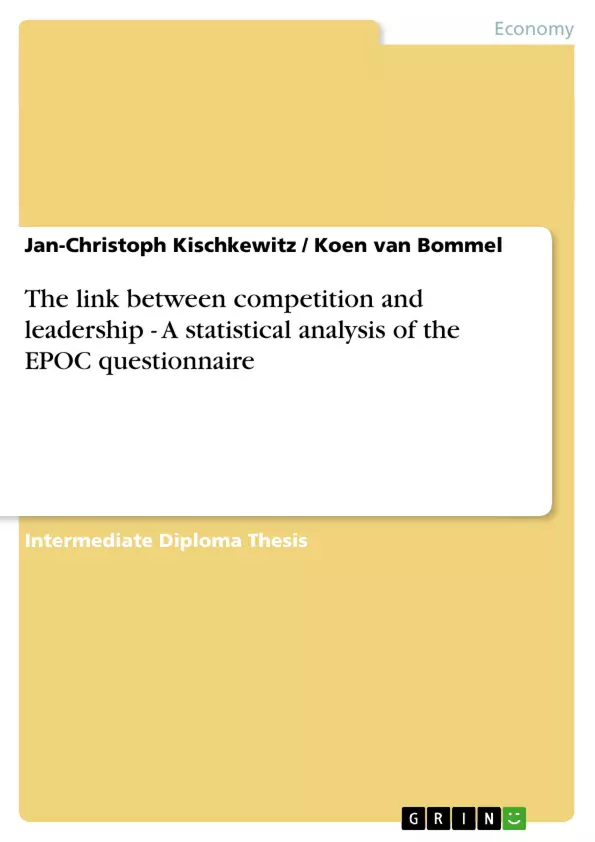The following report is intended to describe a possible relationship between competition and leadership. In order to conduct a sound data analysis with the help of the statistical analysis program SPSS, the two variables have been conceptualized down to a more concrete level, namely degree of competition and leadership style as defined by Geert Hofstede. With the help of the EPOC questionnaire and a solid methodological framework it has been possible to investigate the research hypothesis that suggested a relationship between the two variables.
Derived from the statistical analysis, it can be said that this research does by no means support the hypothesis that an increasing environmental uncertainty, measured by degree of competition, will lead to a more authoritarian style of leadership.
Finally, it can be said that this research has shown that the hypothesis of the supposed causal relation between an increasing environmental uncertainty and a resulting increase in the use of an authoritarian style of leadership, cannot be supported. Until a certain extent, mainly concerning consultation at the group level, an increase in environmental uncertainty will lead to a more consultative style of leadership instead of more authoritarianism in the company.
Additional follow-up research by fellow colleagues can be of important help to furthermore investigate the relationship.
Inhaltsverzeichnis (Table of Contents)
- Summary
- Introduction
- Methodological design
- Research goal
- Central question
- Conceptualization
- Leadership and leadership style
- Uncertainty
- Degree of competition
- Operationalization
- The independent variable
- The dependent variable
- Research questions
- Research design
- Methods of observation
- Data analysis
- Validity/reliability
- Theoretical framework
- Theory description
- Motivation of theory choice
- Statistical analysis and discussion
- Sub-question 1
- Sub-question 2
- Sub-question 3
Zielsetzung und Themenschwerpunkte (Objectives and Key Themes)
This research aims to explore the potential relationship between competition and leadership styles within organizations. The study uses statistical analysis to investigate whether an increase in environmental uncertainty, as measured by the degree of competition, leads to a more authoritarian leadership style.
- Relationship between competition and leadership styles
- Influence of environmental uncertainty on leadership
- Application of statistical analysis to study organizational phenomena
- Contingency theories of leadership
- Measurement of leadership styles
Zusammenfassung der Kapitel (Chapter Summaries)
The study begins with an introduction outlining the research goals and the motivation for investigating the relationship between competition and leadership. The methodological design section defines the research question, conceptualizes the key variables – degree of competition and leadership style – and outlines the operationalization and data analysis techniques used. The theoretical framework chapter presents the theoretical underpinnings of the study, drawing from existing literature on leadership styles and contingency theories. Finally, the statistical analysis and discussion chapter examines the findings of the study, addressing specific research questions related to the relationship between competition and leadership.
Schlüsselwörter (Keywords)
This research focuses on the relationship between competition, environmental uncertainty, and leadership styles. The study utilizes the Employee Participation in Organisational Change (EPOC) questionnaire and statistical analysis techniques to examine how changes in the degree of competition influence leadership behavior. The study also draws upon contingency theories of leadership to provide a theoretical framework for understanding the relationship between these variables.
Frequently Asked Questions
Does intense competition lead to more authoritarian leadership?
Contrary to some theories, this research indicates that increasing environmental uncertainty (competition) does not necessarily lead to more authoritarianism; in fact, it can lead to a more consultative style at the group level.
What is the EPOC questionnaire used for?
The EPOC (Employee Participation in Organisational Change) questionnaire is used to gather data on organizational practices and leadership styles to perform statistical analysis.
How is leadership style defined in this study?
The study conceptualizes leadership styles based on the definitions provided by Geert Hofstede, ranging from authoritarian to consultative approaches.
What is environmental uncertainty in a business context?
In this report, environmental uncertainty is measured by the degree of competition a company faces in its market.
What are contingency theories of leadership?
These theories suggest that there is no single best way to lead; instead, the most effective leadership style depends on the specific situation or "contingencies" like market competition.
What was the central research hypothesis?
The hypothesis suggested a causal relationship where higher competition would result in more authoritarian leadership, which the statistical analysis ultimately failed to support.
- Quote paper
- Jan-Christoph Kischkewitz (Author), Koen van Bommel (Author), 2003, The link between competition and leadership - A statistical analysis of the EPOC questionnaire, Munich, GRIN Verlag, https://www.grin.com/document/20229



